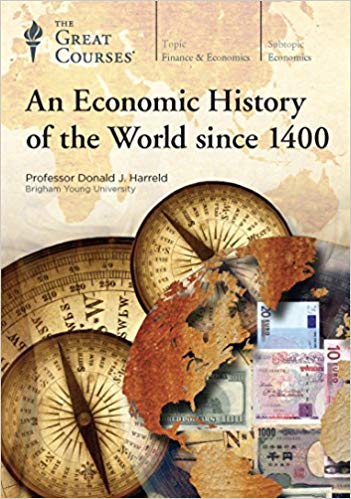You have /5 articles left.
Sign up for a free account or log in.
 On The Great Courses website, An Economic History of the World since 1400 is available in the following formats at the these prices:
On The Great Courses website, An Economic History of the World since 1400 is available in the following formats at the these prices:
- Video Download: $439.95
- Audio Download: $284.95
- DVD: $519.95
- CD: $369.95
I purchased the audio version of the course for $9.56, using my Audible Platinum Annual plan.
No matter what format you buy the course, it will take you 24 hours and 29 minutes to complete.
Enthusiasts of economic history will find the audio version of this Great Courses course, particularly at $9.56, too good a bargain to pass up. Once one starts thinking about economic history, it is almost impossible to think of anything else. Note: This last sentence is adapted from a quote from a 1988 paper by the economist Robert Lucas in On the Mechanics of Economic Development.
I’ll listen to any audiobook that you recommend on economic history. Do you have any to recommend?
Despite years spent as an amateur student of economic history (and 4 years as an undergraduate history major), I still managed to learn more than enough from this audio Great Course to justify the investment in time. The knowledge you get from an audio Great Course such as this is not so much in learning individual facts, but in getting a sense of how the larger story fits together.
A $9.56 audio “course” makes for a good argument against putting content at the center of education. In media content may be king, but not so in education.
An audio “course” is proof that learning can’t be passive. I listened to all 24 hours and 29 minutes, but I didn’t do anything with the material. (Until now).
How much my learning about economic history would have been advanced if I had to take quizzes and exams about the content is questionable. High stakes exams may have concentrated my attention, but I’m not sure about retention. Short quizzes along the way would have helped to consolidate the information in my brain, but again I’m not sure if even formative assessments would aid in making meaning of the content.
What would An Economic History of the World since 1400 be worth if it came attached with college credit?
Mostly, this Great Course resembled an open online course - a MOOC. Or at least a MOOC in how I tend to consume them - which is to interact with the content (watch the videos), rather than with the other learners.
The audio only format of this Great Course worked even better for me than a video-based course, as it allowed for multi-tasking. The only way that I could get through the course is that I listened while doing other things.
Perhaps there are some lessons in audio versions of Great Courses that we should be learning for our participation in the open online learning movement?
Should we be investigating making audio versions of our full courses available as audio downloads? Should we use the reach and distribution of Audible (and Amazon) to get this dreamed about audio-only open educational content to a wider audience? Or does Jeff Bezos already control too much of our information?
Might the incredible growth of the downloadable audiobook format be telling us that we should think about forgoing video in our open online courses, and instead focus on creating robust audio experiences?
Can we imagine aligning the incentives for faculty so that the creation of audio-only courses for a non-academic audience contributed to promotion and tenure?
Would a cross between a MOOC and a Great Course change how we think about open online learning?
Would you take more open online courses if you could multi-task while learning?
Would you be willing to pay $10 for a course that you could listen to while doing something else?




